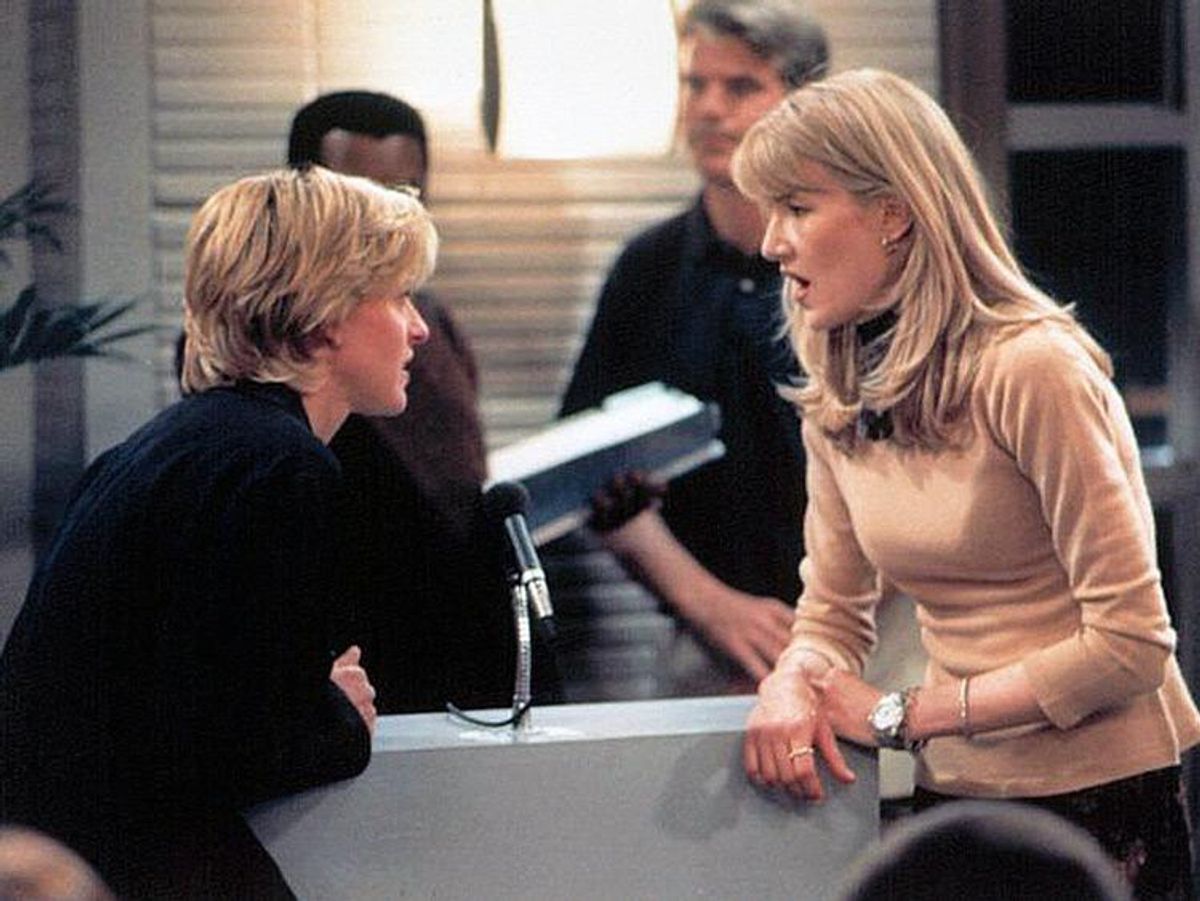Entertainment
1997: Ellen DeGeneres Comes Out

What the landmark television moment means today.
September 16 2017 12:10 PM EST
September 16 2017 12:10 PM EST
By continuing to use our site, you agree to our Private Policy and Terms of Use.

What the landmark television moment means today.
For 25 years, OUT has celebrated queer culture. To mark our silver jubilee, we look back at some of the biggest, brightest moments of the past 9,131 days.
The scene I remember most from the coming-out episode of Ellen DeGeneres' sitcom isn't actually the one in which she first announces she is gay, accidentally speaking to her crush Susan (Laura Dern) over an airport loudspeaker. That moment's great, but what's really burned into my memory is the next episode, when Ellen Morgan is chopping vegetables in her apartment with her already-out friend Peter and casually slips an "I'm gay" into the middle of a conversation about melon ballers. The failed attempt at casualness, the shock it produces, the awkwardness of the character's revelation--the gay gravity of it all--hit little closeted me so hard. Sitting on my parents' couch, I remember looking around to make sure no one else heard it, as if Ellen coming out somehow meant me coming out. In a sense, it did. It was the first time I saw myself represented on television, even if at 10 years old I didn't really get that consciously. I saw my experience--the discomfort, the hiding, the shame, the absurdity--publicized. And I saw a path ahead.
Seen in 2017, the writing and acting in the three-episode arc directly tackling Ellen's sexual orientation feel deeply honest and nuanced. A paradox of the media's increased acceptance of gayness over the past two decades is that LGBT portrayals feel increasingly detached from lived experience. It's great that dozens of shows have queer representation now (there are apparently more than 50 shows with LGBT characters currently streaming on Netflix alone), but those depictions often seem so concerned with assuring viewers that "Gay is OK" that they often don't show the reality: that being gay and especially coming out isn't always OK. It can be messy, sad, and shame-inducing (and sometimes hilarious).
Related | OUT100: Ellen DeGeneres, Entertainer of the Year
DeGeneres and the show's writers also made sure to avoid gayness itself as the punchline. That doesn't mean the episodes weren't gay--k.d. lang, Melissa Etheridge, and Joan Jett made guest appearances. But the humor came from everything surrounding gayness, such as the title character's discomfort with her sexuality and her friends' ham-fisted attempts at accepting her. In that way, the series feels more respectful than many modern TV depictions of sexuality (e.g., in Modern Family, nearly every joke about gay couple Cam and Mitch centers on the hilarity of their flamboyance).
For that nuanced yet candid treatment, the show and DeGeneres paid a price. They lost sponsors; they generated negative press. The series was canceled a year later. But Ellen's demise was also due to an internal problem: Its writers couldn't move past Ellen's sexual orientation. Gayness, like in many other sitcoms, did become the punchline. And so critics, rightly, began to see the show as trite and unmoored.
It's probably unfair to criticize something with 20 years of hindsight, but Ellen's writers and a lot of current writers who focus on LGBT subjects can learn a lesson from this: Queerness itself is only part of a story, and that story gets old fast if it doesn't progress to answer how sexual orientation influences us, our politics, our lives. As Ellen's therapist (played by Oprah) said when Ellen finally came out, "Good for you, you're gay. So what are you gonna do now?"
It's a question I had to ask myself over and over after I came out, and one that I still grapple with to this day--for me to feel whole as a queer person, gayness couldn't just be a box to check off. It had to become something that deeply affected my relationship with friends and family, with politics, with my writing, with everything. In the age of Trump, when we've won media representation but still face discrimination, violence, and unequal access to health care, we might do well to ask ourselves the question that Ellen was never able to fully answer: "We're here. We're queer. Now what?"